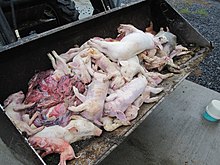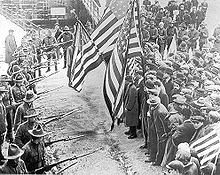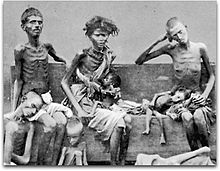User:C.J. Griffin
Appearance
Favorite quotes
[edit]
- Our species is prone to a flattering view of itself. Humans have regarded themselves as the pinnacle of creation, formed by and in the image of an omnibenevolent, omniscient, and omnipotent God, and inhabiting a planet at the center of the universe—a planet around which all others revolve. Science has done much to debunk some of these ideas. We now know that our planet is not at the center of the universe: the earth revolves around the sun rather than vice versa. And we know—or at least some of us do—that we are Johnny-come-lately products of a long, blind evolutionary process.
- David Benatar, The Misanthropic Argument for Anti-natalism (2015), p. 35-36
- Through our predatory behaviors, systems of exploitation, and growth-oriented societies, we have lived in contradiction to one another, other species, and the planet for so long that we have brought about a new geologic epoch. We have hastened the end of the Holocene Era, which endured over the last ten thousand years, and thereby have precipitated the arrival of the Anthropocene Era–whose very name proclaims our global dominance and the severe environmental impact of Homo sapiens. In our current Anthropocene period of runaway climate change, the sixth great extinction crisis in earth's history, resource scarcity, global capitalism, aggressive neoliberalism, economic crashes, increasing centralization of power, rampant militarism, chronic warfare, and suffering and struggle everywhere, we have come to a historical crossroads where momentous choices have to be made and implemented.
- Steven Best, The Politics of Total Liberation: Revolution for the 21st Century (2014), pp. xii-xiii

- "Socialism or Barbarism!" was the cry of the late nineteenth and early twentieth centuries, but in the age of the Anthropocene, when capitalism’s contradictions are fully playing out on a planetary scale, this phrase today would have to be recast as "Socialism or Ecological Collapse!"
- Steven Best, "Failed Species: The Rise and Fall of the Human Empire". Romanian Journal of Artistic Creativity. 9 (2). (2021).
- As we have seen, in the years 1945-1990, a loose network of US-backed anti-communist extermination programs emerged around the world, and they carried out mass murder in at least 22 countries. There was no central plan, no master control room where the whole thing was orchestrated, but I think that the extermination programs in Argentina, Bolivia, Brazil, Chile, Colombia, East Timor, El Salvador, Guatemala, Honduras, Indonesia, Iraq, Mexico, Nicaragua, Paraguay, the Philippines, South Korea, Sudan, Taiwan, Thailand, Uruguay, Venezuela, and Vietnam should be seen as interconnected, and a crucial part of the US victory in the Cold War. (I am not including direct military engagements or even innocent people killed as "collateral damage" in war.) The men carrying out purposeful executions of dissidents and unarmed civilians learned from each other. They adopted methods that were developed in other countries. Sometimes, they even named their operations after other programs they sought to emulate. I found evidence indirectly linking the metaphor "Jakarta," taken from the largest and most important of these programs, to at least eleven countries. But even the regimes that were never influenced by that specific language would have been able to see, very clearly, what the Indonesian military had done and the success and prestige it enjoyed in the West afterward. And though some of these programs were wildly misdirected, and also swept up bystanders who posed no threat whatsoever, they did eliminate real opponents of the global project led by the United States.
- Washington's violent anticommunist crusade destroyed a number of alternative possibilities for world development. The Third World movement fell apart partly because of its own internal failures. But it was also crushed. These countries were trying to do something very, very difficult. It doesn't help when the most powerful government in history is trying to stop you. It's hard to say how they might have reshaped the world if they were truly free to experiment and build something different. Maybe, the countries of the developing world would have been able to come together and insist on changing the rules of global capitalism. Perhaps many of these countries would not be capitalist at all.
- Vincent Bevins, The Jakarta Method: Washington's Anticommunist Crusade and the Mass Murder Program that Shaped Our World, PublicAffairs, 2020. pp. 240-241
- The progress of the last 40 years has been mostly cultural, culminating, the last couple of years, in the broad legalization of same-sex marriage. But by many other measures, especially economic, things have gotten worse, thanks to the establishment of neo-liberal principles — anti-unionism, deregulation, market fundamentalism and intensified, unconscionable greed — that began with Richard Nixon and picked up steam under Ronald Reagan. Too many are suffering now because too few were fighting then.
- Mark Bittman, "Is It Bad Enough Yet?" (December 13, 2014) The New York Times.

- The story of neoliberalism is quite familiar to the millions across the USA whose lives have been ravaged by the "financial crisis of 2007-2008," which led to countless families losing their life savings, homes, and businesses. Commercial media attempted to neutralize the nastiness of neoliberal policies that led directly to this unseemly situation by calling the global emergency "a financial crisis" or "economic downturn," as if these events were unfolding as part of a historical movement or a cyclical part of economic laws. Yet, it was clear that the situation was a direct and logical outcome of the corporate wilding of America, where years of neoliberal policies have resulted in the greatest wealth gap to date in this country. The resulting scenario is violence - but not necessarily the type of violence that media outlets portray. I am not talking about muggings, robberies, or even shootings. I am pointing to a much deeper and sinister type of violence: the type of violence that can be prevented easily, such as the violence of forcing people, especially children, to go perpetually hungry in a society of great abundance; the violence of having people sleep on the streets unprotected from the harsh elements when millions of homes are vacant across the country; and the violence of paying people such low wages that they are unable to secure basic human needs such as clean water, healthy food, dental and medical care, a decent home, affordable transportation, and quality education.
- Jung Min Choi, "Neoliberalism and Education: The Disfiguration of Students," published in Neoliberalism, Economic Radicalism, and the Normalization of Violence. Springer (2016) ISBN 978-3319251677
- While the balance of class power remains heavily tilted in favour of capital in its homelands, the balance of international power is tilting markedly away from capitalism, driving all outside the charmed circle of the United States, Europe, Japan and the settler colonies bit by bit, with advances and reverses, steadily away from the major capitalist countries and probably, from capitalism. This process began with the Russian Revolution and, after the reverses of the 1990s, resumed in the new century as an alliance of countries seeking to assert their economic and security sovereignty—including Russia, Venezuela, Cuba and Iran—began forming with China as its economic centre. The pandemic and the war have accelerated these processes.
- Radhika Desai, Capitalism, Coronavirus and War: A Geopolitical Economy. (2022). p. 179
- Those who have amassed the most power and capital bear the most responsibility for America's vast poverty: political elites, who have utterly failed low-income Americans over the past century; corporate bosses who have spent and schemed to prioritize profits over people; lobbyists blocking the will of the American people with their self-serving interests; property owners who have exiled the poor from entire cities and fueled the affordable housing crisis.
- Matthew Desmond, Poverty, by America (2023), p. 189.
- Too many rich people in the world is a major threat to the human future, and cultural and genetic diversity are great human resources.
- Paul R. Ehrlich, "Paul Ehrlich: 'Collapse of civilisation is a near certainty within decades'" The Guardian (2018)
- American labor was strongest when the threat of communism was greatest. The apogee of America's welfare state, with all its limitations, was coterminous with the height of the Cold War. The dismantling of the welfare state and the labor movement, meanwhile, marched in tandem with communism's collapse.
- Gary Gerstle, The Rise and Fall of the Neoliberal Order: America and the World in the Free Market Era. (2022) p. 12
- If humanity was wiped out today, the Earth would return to a paradise in a few hundred years. If we lose bees, we’re a desert, forever. We’re not that important. We’re just one species of narcissistic ape. And some people on social media get annoyed when I say we’re apes. You know, religious types, Americans.
- Ricky Gervais, Ricky Gervais: Armageddon (transcript). December 2023.
- Throughout much of the twentieth century, state socialism presented an existential challenge to the worst excesses of the free market. The threat posed by Marxist ideologies forced Western governments to expand social safety nets to protect workers from the unpredictable but inevitable booms and busts of the capitalist economy. After the Berlin Wall fell, many celebrated the triumph of the West, consigning socialist ideas to the dustbin of history. But for all its faults, state socialism provided an important foil for capitalism. It was in response to a global discourse of social and economic rights—a discourse that appealed not only to the progressive populations of Africa, Asia, and Latin America but also to many men and women in Western Europe and North America—that politicians agreed to improve working conditions for wage laborers as well as create social programs for children, the poor, the elderly, the sick, and the disabled, mitigating exploitation and the growth of income inequality. Although there were important antecedents in the 1980s, once state socialism collapsed, capitalism shook off the constraints of market regulation and income redistribution. Without the looming threat of a rival superpower, the last thirty years of global neoliberalism have witnessed a rapid shriveling of social programs that protect citizens from cyclical instability and financial crises and reduce the vast inequality of economic outcomes between those at the top and bottom of the income distribution.
- Kristen Ghodsee, Why Women Have Better Sex Under Socialism (2018) p. 3-4
- In 1973, CIA-psychological operatives in Chile scrawled graffiti on the sides of buildings that read "Jakarta se acerca" – "Jakarta is coming." This was a reference to the massive CIA orchestrated 1965 bloodletting in Indonesia which overthrew Sukarno and made the country safe for US corporations like Freeport Sulphur. The American and Indonesian governments have never acknowledged the truth of those events. But we must confront these sorts of dark truths if we are to move forward as a civilization.
- Aaron Good, American Exception: Empire and the Deep State. Skyhorse Publishing. (2022) p. 290. ISBN 978-1510769137

- As long as the Earth is viewed as the personal property of the human race, a belief embraced by everyone from born-again Christians to Marxists to free-market economists, we are destined to soon inhabit a biological wasteland.
- Chris Hedges, "We Are Breeding Ourselves to Extinction", Truthdig, March 9, 2009
- My attitude toward becoming a vegan was similar to Augustine’s attitude toward becoming celibate — “God grant me abstinence, but not yet.” But with animal agriculture as the leading cause of species extinction, water pollution, ocean dead zones and habitat destruction, and with the death spiral of the ecosystem ever more pronounced, becoming vegan is the most important and direct change we can immediately make to save the planet and its species. It is one that my wife — who was the engine behind our family’s shift — and I have made.
- Chris Hedges, "Saving the Planet, One Meal at a Time", Truthdig, November 10, 2014
- The oligarchs are happy to talk about race. They are happy to talk about sexual identity and gender. They are happy to talk about patriotism. They are happy to talk about religion. They are happy to talk about immigration. They are happy to talk about abortion. They are happy to talk about gun control. They are happy to talk about cultural degeneracy or cultural freedom. They are not happy to talk about class. Race, gender, religion, abortion, immigration, gun control, culture and patriotism are issues used to divide the public, to turn neighbor against neighbor, to fuel virulent hatreds and antagonisms. The culture wars give the oligarchs, both Democrats and Republicans, the cover to continue the pillage. There are few substantial differences between the two ruling political parties in the United States. This is why oligarchs like Donald Trump and Michael Bloomberg can switch effortlessly from one party to the other. Once oligarchs seize power, Aristotle wrote, a society must either accept tyranny or choose revolution.
- Chris Hedges, "Class: The Little Word the Elites Want You to Forget" Truthdig, March 2, 2020

- If we dig behind the rhetoric, it becomes clear that Western support for right-wing coups had little to do with Cold War ideology, and certainly nothing to do with promoting democracy (quite the opposite!); the goal, rather, was to defend Western economic interests. The veil of the Cold War has obscured this blunt fact from view.
- Jason Hickel, The Divide: Global Inequality from Conquest to Free Markets (2018), p. 140
- Capitalism itself creates pressures for population growth: more people means more labour, cheaper labour, and more consumers. These pressures filter into our culture, and even into national policy: countries like France and Japan are offering incentives to get women to have more children, to keep their economies growing.
- Jason Hickel, Less is More: How Degrowth Will Save the World, 2021, pp. 110-111
- Civilization is based on a clearly defined and widely accepted yet often unarticulated hierarchy. Violence done by those higher on the hierarchy to those lower is nearly always invisible, that is, unnoticed. When it is noticed, it is fully rationalized. Violence done by those lower on the hierarchy to those higher is unthinkable, and when it does occur is regarded with shock, horror, and the fetishization of the victims.
- Derrick Jensen, Endgame (2006), p. ix
- It's quite obvious that when the Eastern bloc was still there, it was a bustle between capitalism and communism. Once communism was defeated, then capitalism could expand and show its true self. It's no longer constrained by the need to be nice, so that people will choose their so-called free-market system as opposed to the centrally planned system. So because of that, nowadays there is nothing to restrain capital, and capital is demanding that it should be able to go anywhere and do whatever it likes.
- Mahathir bin Mohamad, "Commanding Heights" interview with PBS (2 July 2001).

- The capitalist system was and is not a benevolent social force created to best serve the needs of humans through the "marketplace," contrary to the propagandizing that has inundated at least the citizens in the West for a century and a half and that continues in educational systems and mass media today. Indeed, it would be impossible for an egalitarian, beneficial political-economic system to emerge from thousands of years of hypermasculine, violent, oppressive, and war-torn reality. In truth, capitalism, which morphed from the highly oppressive systems of "economic development" of the Eurasian past, simply represents a more sophisticated form of social relations in which the accumulation of wealth continues to result from exploitation, predation and violence.
- David Nibert, Animal Oppression and Capitalism (2017), p. xiv

- The overthrow of communism gave a green light to the unbridled exploitative impulses of Western corporate interests. No longer needing to convince workers that they live better than their counterparts in Russia, and no longer constrained by a competing system, the corporate class is rolling back the many gains that working people in the West have won over the years. Now that the free market, in its meanest form, is emerging triumphant in the East, so will it prevail in the West . . . Having never understood the role that existing communist powers played in tempering the worst impulses of Western capitalism and imperialism, and having perceived communism as nothing but an unmitigated evil, the left anticommunists did not anticipate the losses that were to come. Some of them still don't get it.
- Michael Parenti, Blackshirts and Reds: Rational Fascism and the Overthrow of Communism (1997), p. 58
- Putting an end to the population explosion will not of itself save the ecosphere, but not ending it will add greatly to the dangers the planet faces. The environment can sustain a quality of life for just so many people
- Michael Parenti, Blackshirts and Reds: Rational Fascism and the Overthrow of Communism (1997), p. 155
- Compassion for animals is intimately associated with goodness of character, and it may be confidently asserted that he who is cruel to living creatures cannot be a good man.
- Arthur Schopenhauer, On the Basis of Morality Part III, Ch. VIII, 7, p. 223 (1840)
- Let's take the case of slavery. While capitalism legitimizes itself as the economic system that implies and furthers personal freedom (as a condition of market exchange), it generated slavery on its own, as part of its own dynamics: although slavery became almost extinct at the end of the Middle Ages, it re-emerged in colonies from early modernity till the American Civil War. And one can risk the hypothesis that today, with the new epoch of global capitalism, a new era of slavery is also arising. Although there is no longer a direct legal category of enslaved persons, slavery acquires a multitude of new forms: millions of migrant workers in the Saudi peninsula (UAE, Qatar, etc.), who are deprived of elementary civil rights and freedoms and subjected to restricted mobility; the total control of millions of workers in Asian sweatshops, often consciously organized as concentration camps; the massive use of forced labor in the exploitation of natural resources in many Central African states (Congo, etc.). This new de facto apartheid, this systematic explosion of a number of different forms of contemporary slavery, is not a deplorable accident but a structural necessity of today's global capitalism.
- Slavoj Žižek, The Courage of Hopelessness: A Year of Acting Dangerously (2018), p. 29
- The freedom that socialism gave every man and enshrined in its constitution is the freedom not to be a beggar and not to be exploited. Freedom from the fear of losing one’s job tomorrow, of being unable to pay for one’s housing, food, clothing and vital medicines. Of not being able to pay for the education and feed one’s children. Not being able to support elderly parents. A freedom to feel a full individual and not a human good sold in the labour market. A freedom that was granted to all regardless of their background, nationality or profession. To workers, peasants, scientists and artists. Only such freedom can be recognised as true freedom. Its absence makes all the other freedoms meaningless.
- Gennady Zyuganov, "Socialism Is Genuine Freedom" (22 November 2017)
